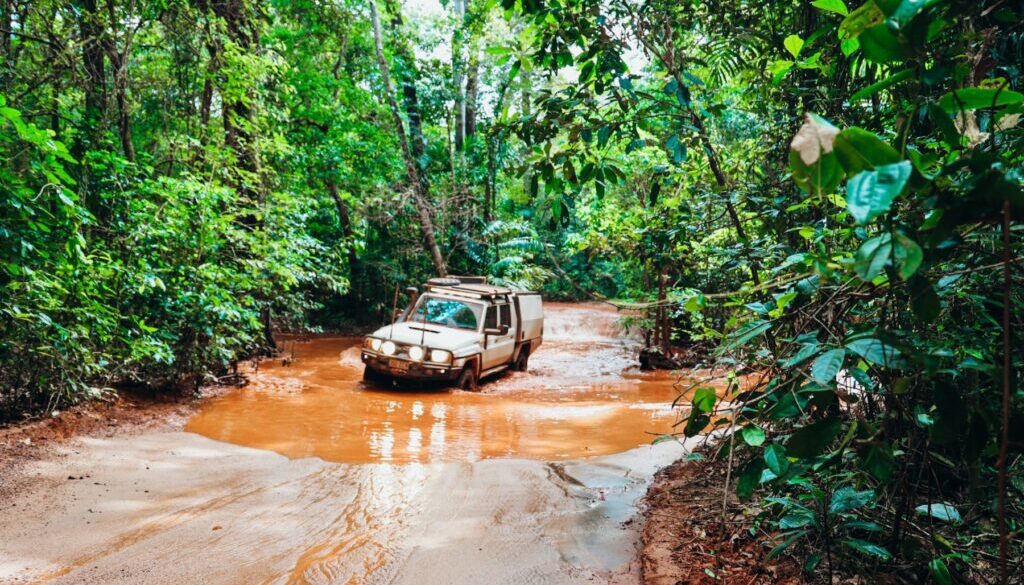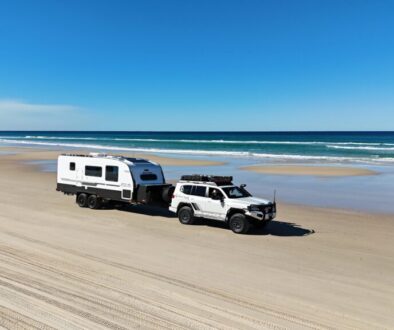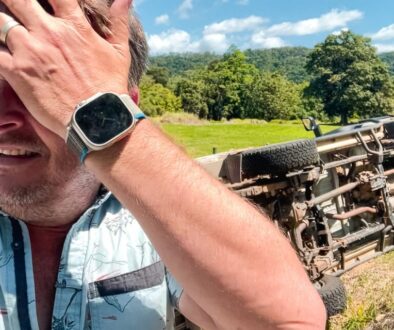Remote Touring Australia? The Best Gear To Keep You Out Of Trouble
The Best Gear to Keep You Safe On And Off-Road
If you’re thinking about remote touring Australia’s outback in a caravan, you should bring essential spare parts for your vehicles, a well-stocked first aid kit, adequate food and water supplies, reliable communication devices, and appropriate camping gear for the harsh environments. Additionally, ensure your vehicles have off-road tyres, sufficient fuel storage, and a comprehensive tool kit for any repairs.
Exploring Australia’s outback is a dream for many travellers, with its vast and rugged landscapes offering unparalleled adventure. However, venturing into these remote regions requires careful planning and preparation. Ensuring your tow vehicle and caravan are in top condition, equipped with essential spare parts, and ready for off-road challenges is crucial for a safe and enjoyable journey. By preparing thoroughly, you can fully immerse yourself in the outback’s natural beauty and create memories that will last a lifetime.
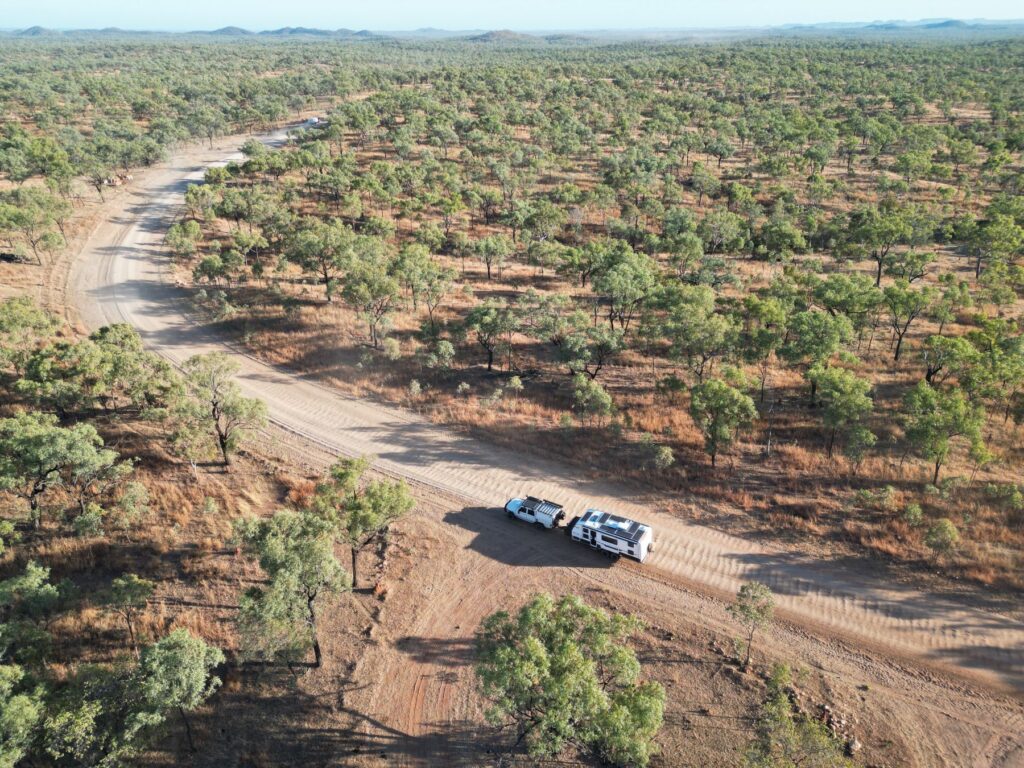
-
Vehicle and Caravan Preparation
Regular Maintenance Checks
Importance of a thorough service and inspection before embarking on the journey:
Before setting out on your outback adventure, it’s crucial to ensure your vehicles are in top condition through regular maintenance checks. A comprehensive service and inspection should be your first step, focusing on essential components such as oil, coolant, brake fluid, tyre conditions, and pressures. These checks are vital for identifying potential issues before they become major problems on the road. Ensuring your vehicle is well-maintained minimises the risk of breakdowns and increases your safety during the journey.
- Schedule a professional service for both your tow vehicle and caravan at least one month before your trip.
- Check your vehicle and caravan’s manual for specific maintenance recommendations.
This proactive approach helps identify and rectify any potential issues during your journey. Key points to consider during these checks include:
- Engine Health: Ensure the engine oil, coolant, and brake fluid levels are optimal and the engine runs smoothly.
- Tyree Safety: Inspect the tyre pressures, tread depth, and overall condition of the vehicle and caravan tyres. Include a check on your bearings and brakes during your vehicle service.
- System Checks: Test the brake system including break-away if installed on your caravan, suspension, lights, and steering components to ensure they’re in good working order.
Specific checks to perform: oil, coolant, brake fluid, tyre conditions, brakes, suspension, and steering components:
In addition to general maintenance, pay special attention to critical components essential for safe and reliable travel. Check the oil level and quality, ensuring it’s within the recommended range and contamination-free. Coolant levels should be adequate to prevent overheating, and brake fluid should be at the proper level and in good condition. Inspect tyre conditions for tread depth, wear patterns, and proper inflation. Finally, examine the brakes, suspension, and steering components for any wear or damage, as these are crucial for vehicle control and stability on rough outback roads.
- Perform a thorough inspection of all critical components.
- Address any issues or concerns before departing on your journey.
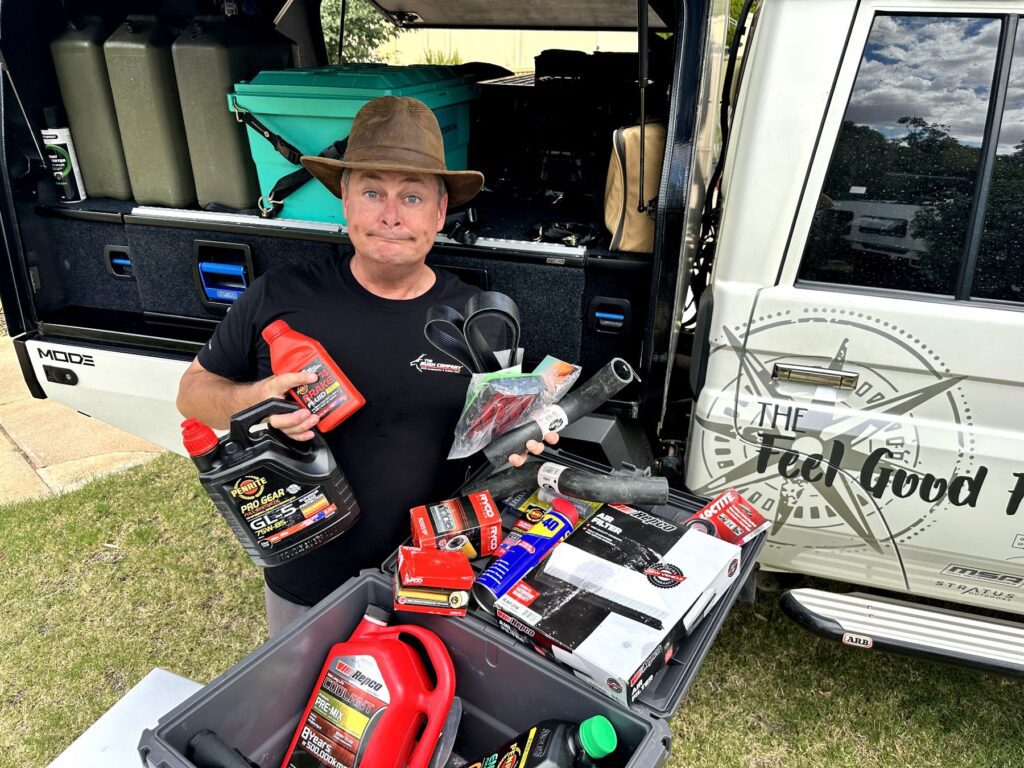
Essential Spare Parts
Necessity of carrying a basic toolkit and spare parts:
When travelling in remote areas, preparing for unexpected repairs is essential. Carrying a basic toolkit and crucial spare parts can make all the difference in quickly getting you back on the road. A toolkit should include screwdrivers, pliers, a wrench set, and a tyre repair kit. Spare parts you should consider include a spare tyre, drive belts, hoses, fuses, pre-greased wheel bearings and fluids. These items help you address minor issues without professional assistance, saving time and potentially avoiding costly towing fees.
- Pack a well-organised toolkit with essential tools.
- Store spare parts securely in your vehicle, easily accessible when needed.
List of critical spare parts: spare tyre, drive belts, hoses, pre-greased wheel bearings, fuses, fluids, fuel filter, air filter, oil filter, shock absorbers
In addition to an essential toolkit, carrying critical spare parts can further enhance your preparedness. A spare tyre is a must-have for any road trip, especially in areas where tyre damage is typical. Spare drive belts and hoses can be lifesavers in case of unexpected failures. Fuses, fluids, and filters (fuel, air, and oil) are essential for maintaining vehicle performance and preventing breakdowns. Spare pre-greased wheel bearings and shock absorbers are also crucial, especially when driving on rough outback terrain, as they help maintain vehicle stability and control.
- Prioritise critical spare parts based on your vehicle’s specific needs and the terrain you’ll be encountering.
- Regularly check the condition of your spare parts and replace them as needed.
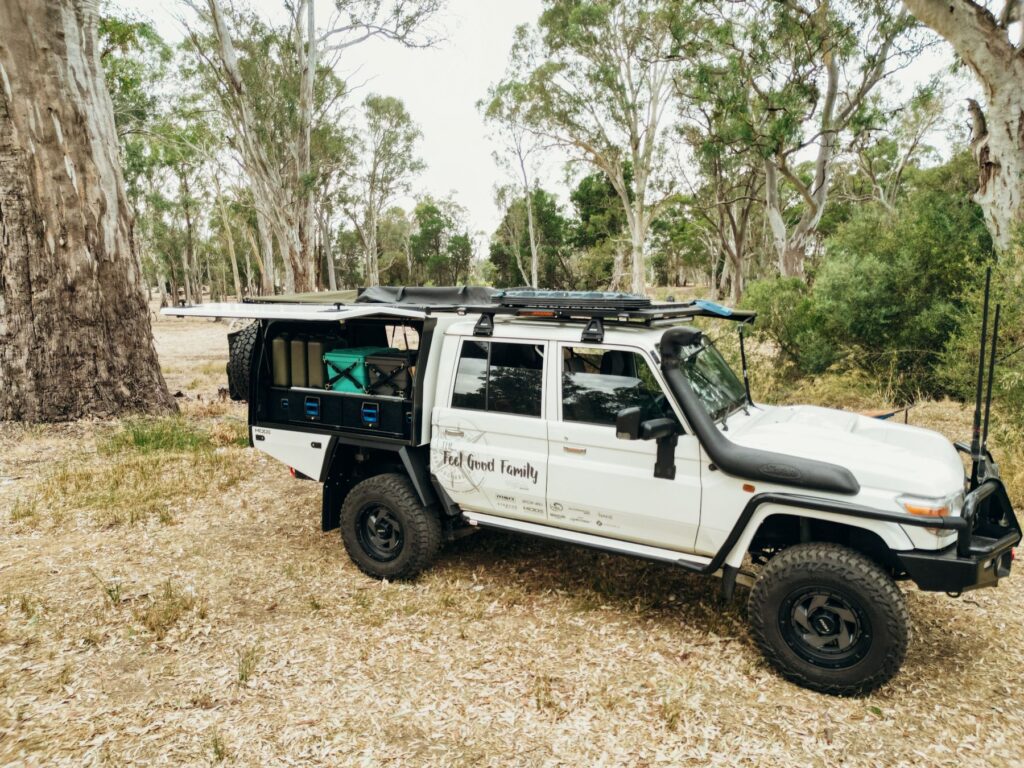
Vehicle-Specific Spares
Importance of tailoring the spare parts list to your vehicle’s make and model:
Each vehicle has its own set of requirements for spare parts. Tailoring your spare parts list to your vehicle’s make and model ensures you have the right items for any repairs. Consult your vehicle’s manual or speak with a mechanic to determine the spare parts most likely needed for your car. By customising your spare parts list, you ensure you’re fully prepared for any issues that may arise during your outback adventure.
- Research your vehicle’s everyday issues and spare part requirements.
- Update your spare parts list as you gain more experience with your vehicle’s performance in different conditions.
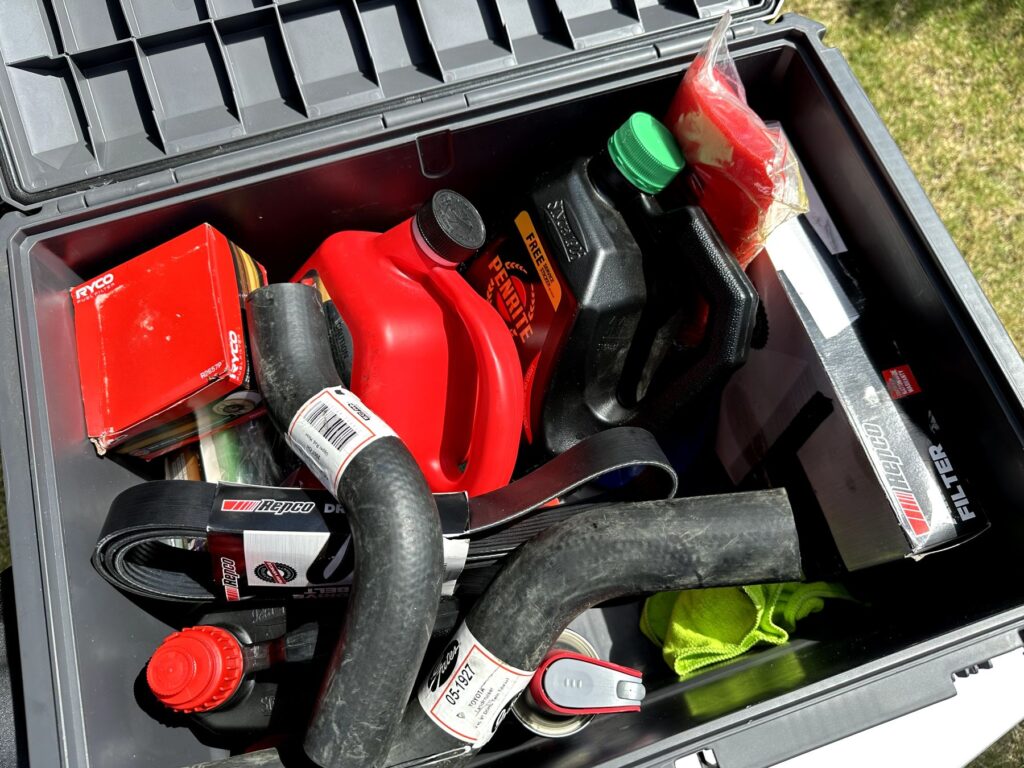
An example list for a Toyota Landcruiser 79 Series might include:
For owners of a Toyota Landcruiser 79 Series, some specific spare parts to consider include radiator hoses and clamps, oil filters, fuel filters, air filters, brake fluid, diff oil, engine oil, coolant, and a serpentine/drive belt. Additionally, carrying a snorkel filter and cartridge can benefit dusty environments. Various fixtures, fittings, and miscellaneous items like rubber grease, bearing grease, and a mini grease gun can also be helpful for on-the-go repairs and maintenance.
- Tailor your spare parts list to the specific needs, like we did for our Toyota Landcruiser 79 Series.
- Regularly review and update your list based on your travel experiences and vehicle performance.
Know Your Vehicle
The value of being familiar with your vehicle’s everyday issues and maintenance requirements:
Understanding your vehicle’s everyday issues and maintenance requirements is key to a successful outback journey. Familiarise yourself with your vehicle’s specific needs, including its service intervals, typical wear and tear items, and any known issues that may arise. This knowledge allows you to anticipate potential problems and address them proactively. Additionally, being well-versed in your vehicle’s operation can help you diagnose issues more accurately and communicate effectively with mechanics if professional assistance is needed.
- Regularly review your vehicle’s maintenance history and any manufacturer recalls or advisories.
- Stay informed about your vehicle’s performance through online forums or owner groups specific to your make and model.
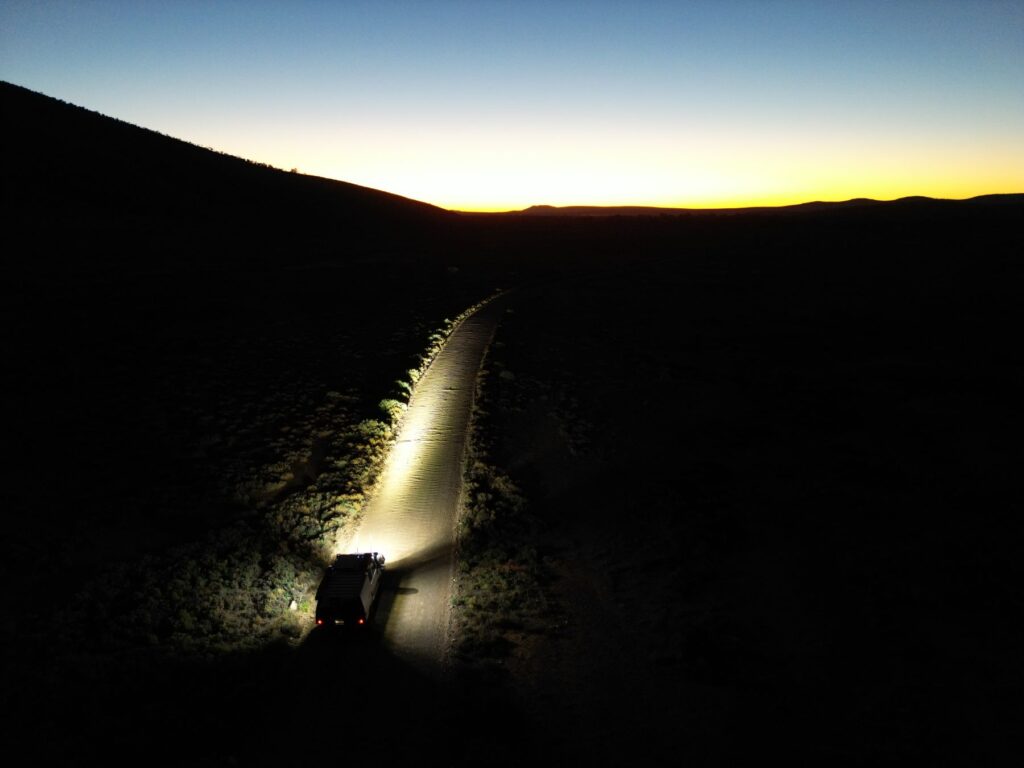
The value of understanding your vehicle’s capabilities and limitations:
Knowing your vehicle’s capabilities and limitations is crucial for safe and enjoyable outback travel. Familiarise yourself with its off-road capabilities, towing capacity, fuel efficiency, and load limits. This understanding will help you make informed decisions when planning your route, loading your vehicle, and tackling challenging terrain. It also ensures that you keep your vehicle within its limits, which could otherwise lead to breakdowns or unsafe situations.
- Assess your vehicle’s suitability for the specific conditions you’ll encounter on your journey.
- Adapt your driving style and travel plans based on your vehicle’s capabilities and limitations.
Off-Road Readiness:
If your journey involves off-road travel, ensure your vehicle and caravan are equipped for the challenge. Essential considerations for off-road readiness include:
- Off-Road tyres: Equip your caravan with off-road tyres that can handle rough terrain and provide better traction.
- Fuel Storage: Consider installing a long range fuel tank on your vehicle to cover long distances between fuel stops in remote areas.
- Suspension and Ground Clearance: Check that your caravan’s suspension suits off-road conditions and that you have adequate ground clearance to navigate uneven terrain.
-
Safety and Navigation
First Aid Kit: Preparing for emergencies is crucial in the vast expanses of Australia’s outback. A well-stocked first aid kit is an essential item for any traveller. It should include a variety of bandages and specific compression bandages, antiseptics, pain relievers, and personal medications. The ability to administer first aid can differ between minor setbacks and emergencies. Regularly check your kit for expired items and replenish as needed.
- Ensure a first aid kit is easily accessible in both your vehicle and caravan.
- Include items for treating bites, burns, and injuries common in outdoor settings.
- Ensure you have a snake and spider bite kit in both your vehicle and caravan.
- Consider taking a first aid course before departing.
Communication Devices: Staying connected in remote areas is vital for safety and peace of mind. Reliable communication devices such as personal locator beacons (PLBs), two-way radios, and smart phones with emergency SOS satellite features should be part of your gear. These devices can provide a lifeline in emergencies, allowing you to contact emergency services or stay in touch with fellow travellers.
- Test your devices before departure to ensure they’re in working order.
- Familiarise yourself with their operation and limitations.
- Keep them charged, and consider carrying backup power sources.
Navigation Tools: In the outback, where traditional landmarks are sparse and mobile signal can be non-existent, navigation tools are indispensable. GPS can provide accurate location information, while physical maps offer a reliable backup. Ensure your maps are up-to-date and cover the areas you plan to explore. Marking your route and points of interest can help you stay on track and make informed decisions.
- Consider carrying a compass as an additional navigation aid.
- Download digital maps to your devices to use offline when out of cellular service.
- Plan your route and inform someone of your itinerary.
- Regularly check your position to avoid getting lost in remote areas.
-
Food and Water Supplies
Adequate Supplies: In the remote expanses of Australia’s outback, food and water can be scarce. It’s essential to stock up on enough supplies to last the duration of your journey, plus some extra in case of unexpected delays. Consider non-perishable food items that are easy to prepare and high in energy. A good rule of thumb for water is to carry at least 4-5 litres per person per day for drinking, cooking, and hygiene.
- Plan your meals to determine the quantity of food needed.
- Pre-prepare meals and freeze for convenience.
- Include a variety of foods to maintain a balanced diet.
- Always have emergency rations in case you get stranded.
- Dehydrated food pouches are a great back-up plan
Storage Solutions: Efficient storage is vital to managing your food and water supplies in a caravan. Use airtight containers to keep food fresh and protect it from pests. For water, consider using collapsible containers to save space when they’re empty. Utilise your caravan’s fridge and pantry spaces effectively, considering the weight distribution for safe towing.
- Label your food containers with contents and expiration dates.
- Use stackable containers to maximise space and organisation.
- Pack heavy items down low and over the axles of your caravan for safe weight distribution.
- Regularly monitor your water levels and replenish them at every opportunity.
-
Camping Gear and Equipment
Essential Gear: If you are planning on remote hiking or overnighting away from your caravan, Australia’s harsh outback environment demands durable and reliable camping gear. A sturdy tent, comfortable weather rated sleeping bags, and insulating mats are non-negotiable if you’re planning on a good night’s sleep under the stars. Quality outdoor clothing, including wide brimmed hats, sunglasses, and protective closed toe footwear, will help you withstand the elements. Additionally, portable cooking equipment and utensils are essential for meals in remote locations.Choose gear that is lightweight yet robust to withstand the outback’s conditions.
- Consider the season and weather patterns when selecting your camping attire.
- Pack collapsible furniture like chairs and tables for added comfort at your campsite.
Tool Kit: A comprehensive tool kit is indispensable to your outback adventure. It should include basic tools such as screwdrivers, pliers, a hammer, a wrench set, and specific items like spare fuses, tyre repair kits, and a jack. The right tools can distinguish between a minor inconvenience and a trip-ending breakdown. Regularly check and update your tool kit to ensure everything is working.
- Tailor your tool kit to the specific needs of your vehicle and caravan.
- Include a flashlight and headlamp for repairs in low-light conditions.
- Store your tools in a sturdy, organised case for easy access when needed.
-
Monitor Your Vehicle
Monitoring the vehicle’s temperature gauge, oil pressure, wheel hub temperatures, and warning lights:
Keeping a close eye on your vehicle’s vital signs is essential for preventing breakdowns and ensuring a safe journey. Regularly monitor the temperature gauge to avoid overheating, which can cause significant engine damage. Oil pressure is another critical indicator of your engine’s health, as low pressure could signal a leak or other serious issue. Wheel hub temperatures can provide early warnings of brake or bearing problems. Pay attention to any warning lights on your dashboard, as they are designed to alert you to potential issues before they become significant problems.
- Use a digital infrared thermometer to check wheel hub temperatures during breaks.
- Familiarise yourself with the meaning of different warning lights in your vehicle’s manual.
Importance of investigating any unusual sounds, vibrations, or heat:
Unusual sounds, vibrations, or excessive heat can indicate mechanical issues early. If you notice any strange noises, such as grinding, knocking, or whistling, it’s important to investigate the source promptly. Vibrations can signal issues with the suspension, tyres, or drivetrain. Excessive heat, especially from the engine or brakes, can indicate overheating or friction problems. Addressing these signs early can prevent more significant damage and ensure your vehicle remains reliable throughout your journey.
- Conduct a visual inspection and listen for unusual sounds when the vehicle is stationary.
- If you cannot identify the cause of a sound or vibration, seek professional assistance as soon as possible.
-
Seek Professional Help
Seek help from a qualified mechanic when needed:
When travelling in the vast and remote outback, encountering mechanical issues can be a daunting experience. However, it’s crucial to recognise when a problem is beyond your ability to repair and to seek assistance from a qualified mechanic. (Travelling with Starlink portable internet, we’ve video-called ours when we have run into issues in the past, and they were able to walk us through and get us back on the road).
Professionals can repair your vehicle correctly and prevent further damage. Contact roadside assistance or a nearby repair shop if you need clarification on a repair or if the issue is critical.
- Always have contact information for roadside assistance and local mechanics in the areas you’ll be travelling through.
- Consider investing in a satellite phone or other communication devices (we use Starlink to stay connected in remote areas) to ensure you can reach out for help even in areas without phone coverage.
Do not to drive if the vehicle is unsafe:
Your safety and the safety of your passengers should always be the top priority. If your vehicle is experiencing issues that compromise its safety, it’s imperative not to continue driving. Continuing to drive an unsafe vehicle can lead to accidents, further damage, or even getting stranded in a remote location. Regularly assess your vehicle’s condition before embarking on long stretches of isolated road.
- If you need more clarification about your vehicle’s condition, seek a professional opinion before continuing your journey.
- In the event of a break-down it is recommended to never leave your vehicle. You are safer to wait for help to arrive.
Remote Touring Australia? The Best Gear Categorised
Classification | Category | Item | Frequency of Use | Emergency Gear |
Essential | Emergency Gear | First aid kit | As needed | Yes |
Essential | Emergency Gear | Fire extinguisher | As needed | Yes |
Essential | Emergency Gear | Personal Locator Beacon | As needed | Yes |
Essential | Emergency Gear | Jump starter | Rarely | Yes |
Essential | Vehicle | Navigation tools (GPS, maps) | Daily | No |
Essential | Vehicle | Spare fluids (oil, coolant, brake fluid) | Monthly | No |
Essential | Vehicle | Digital infrared thermometer | Weekly | No |
Essential | Vehicle | Air compressor | Weekly | No |
Essential | Vehicle | Spare hoses | Rarely | No |
Essential | Vehicle | Spare fuses | Rarely | No |
Essential | Vehicle | Fuel filter | Rarely | No |
Essential | Vehicle | Air filter | Rarely | No |
Essential | Vehicle | Oil filter | Rarely | No |
Essential | Vehicle | Shock absorbers | Rarely | No |
Essential | Vehicle | Tyre repair kit | Rarely | No |
Essential | Vehicle | Serpentine/drive belt | Rarely | No |
Essential | Vehicle | Snorkel filter and cartridge | Rarely | No |
Essential | Vehicle | Rubber grease | Rarely | No |
Essential | Vehicle | Multipurpose grease | Rarely | No |
Essential | Vehicle | Mini grease gun | Rarely | No |
Essential | Vehicle | Loctite insulating and sealing wrap | Rarely | No |
Essential | Vehicle | Epoxy putty | Rarely | No |
Essential | Vehicle | Wheel studs | Rarely | No |
Essential | Vehicle | Pre-packed bearings | Rarely | No |
Essential | Vehicle | Expedition 134 storage boxes | Daily | No |
Essential | Camping | Airtight food containers | Daily | No |
Essential | Camping | Collapsible water containers | Daily | No |
Essential | Camping | Portable cooking equipment and utensils | Daily | No |
Essential | Camping | Rear Wheel Rubbish Bag | Weekly | No |
Essential | Camping | Paper towel | Daily | No |
Essential | Camping | Non-perishable food items | Daily | No |
Essential | Camping | Flashlight or headlamp | Daily | No |
Essential | Camping | Wet bag | Weekly | No |
Essential | Camping | Adventure Pump 12v water transfer kit | Weekly | No |
Essential | Camping | Outback Tracks screw in pegs | Weekly | No |
Essential | Camping | Tidy Turf Mats | Daily | No |
Essential | Recreational | Outdoor clothing (hats, sunglasses, footwear) | Daily | No |
Essential | Recreational | Caps | Daily | No |
Nice to Have | Recreational | Nakie Hammock | Weekly | No |
Nice to Have | Recreational | Fishing reels | Weekly | No |
Nice to Have | Recreational | Fishing gear (lures, etc.) | Weekly | No |
Nice to Have | Recreational | Coffee maker | Daily | No |
Nice to Have | Recreational | Coffee and tea canisters | Daily | No |
Nice to Have | Recreational | Stubby coolers | Weekly | No |
Nice to Have | Recreational | Snorkel masks and fins | Rarely | No |
Nice to Have | Recreational | Wetsuits | Rarely | No |
Nice to Have | Recreational | Jasper’s outdoor toys, games and equipment | Weekly | No |
Nice to Have | Recreational | Outdoor cinema projector and extension lead | Monthly | No |
Essential | Camping | Stratus Outdoors camping chairs and table | Daily | No |
Nice to Have | Camping | MSA deluxe cutlery kit | Daily | No |
Nice to Have | Camping | Stratus Outdoors plates, bowls, mugs | Daily | No |
Nice to Have | Camping | Stratus Outdoors single cutlery packs | Daily | No |
Nice to Have | Camping | Firewood (in the rear wheel bag) | Weekly | No |
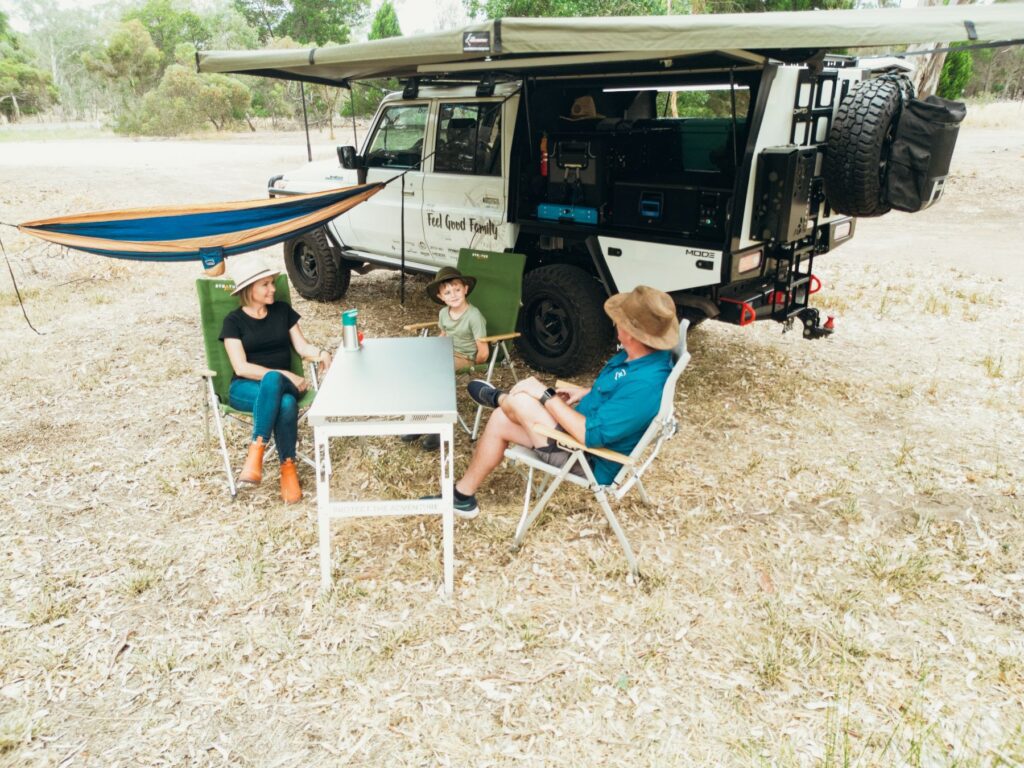
FAQ

